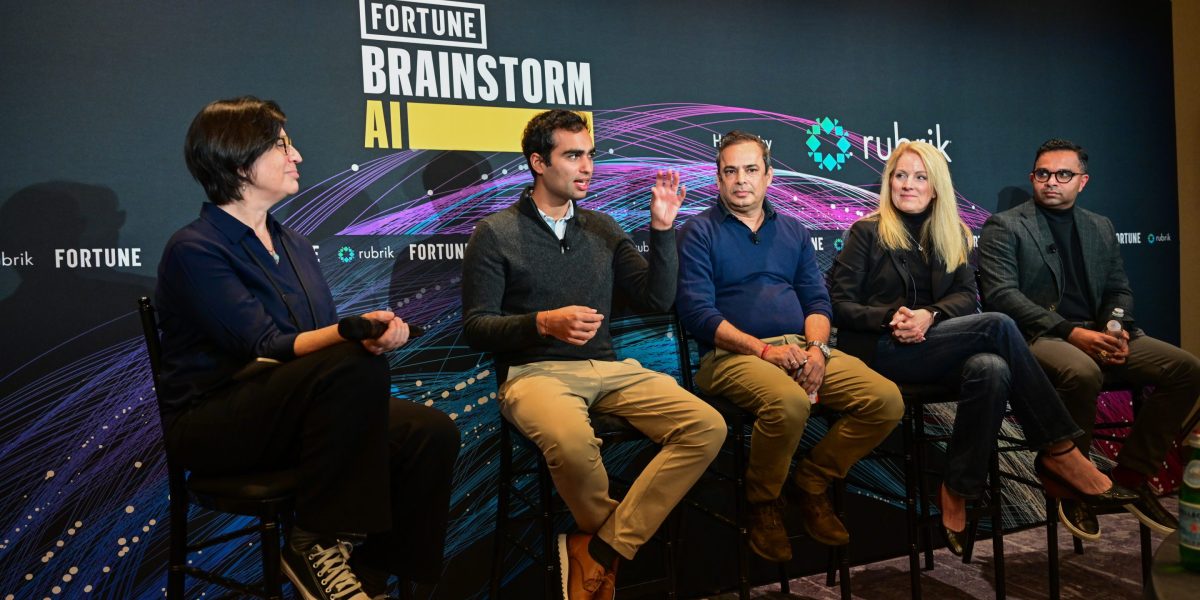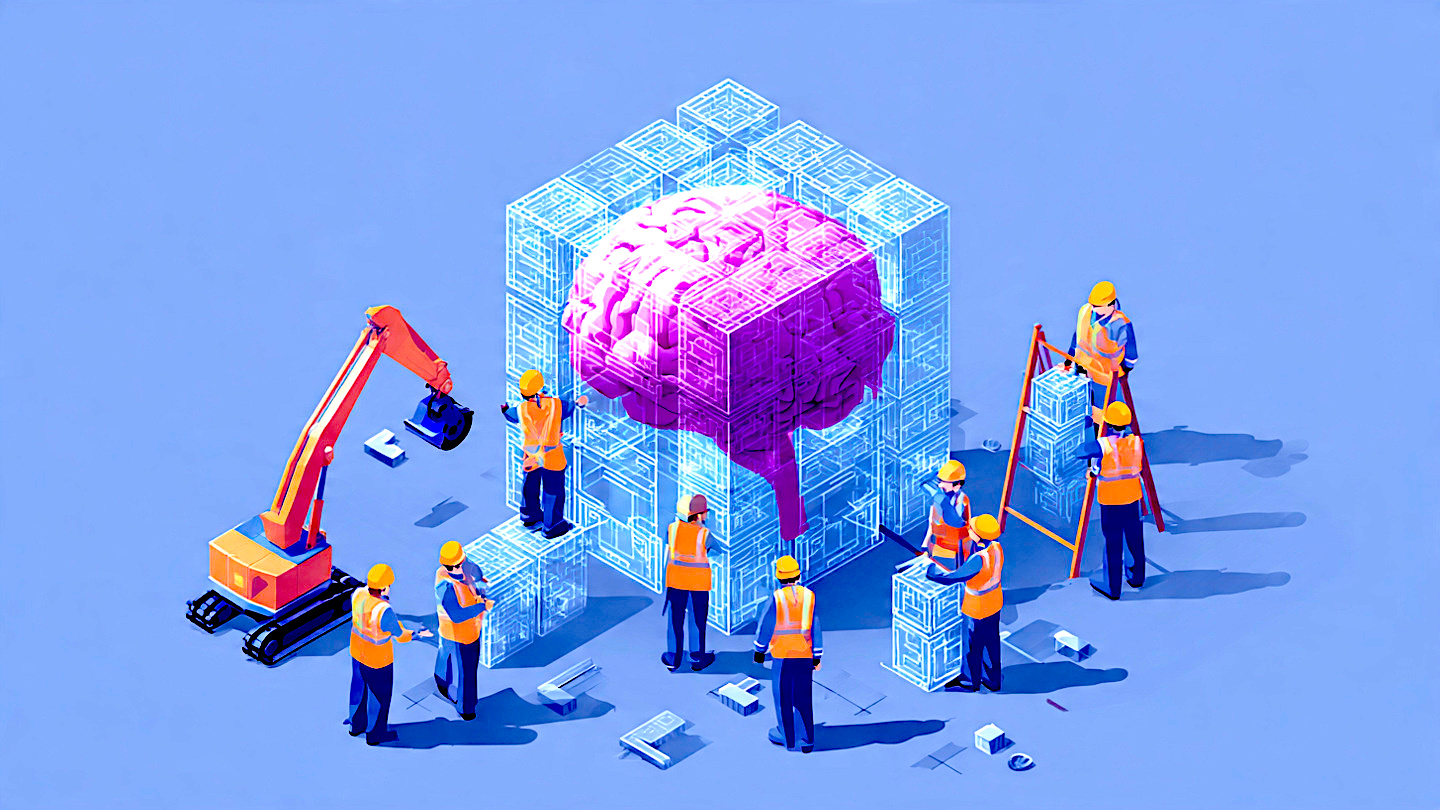#ai-governance
#ai-governance
[ follow ]
#ai-safety #ai-adoption #data-privacy #generative-ai #enterprise-ai #agentic-ai #artificial-intelligence
fromDevOps.com
1 day agoWhy Responsible AI Isn't Optional in DevOps - it is the Next Frontier of Ownership - DevOps.com
Recently, AI has infiltrated every corner of software delivery. It is writing code, tuning tests, fixing bugs, correlating logs and - most provocatively - making decisions inside CI/CD pipelines that used to be purely human territory. This isn't marketing hype - it is the inevitable result of handing models not just data, but influence. Influence without accountability is the sort of blind spot that turns innovation into chaos.
Artificial intelligence
fromBusiness Insider
1 week agoAnthropic CEO warns tech titans not to dismiss the public's AI concerns: 'You're going to get a mob coming for you'
Anthropic CEO Dario Amodei has a grave warning for fellow AI titans who dismiss the public's concerns about AI. "You can't just go around saying we're going to create all this abundance, a lot of it is going to go to us, and we're going to be trillionaires, and no one's going to complain about that," Amodei told Axios in an interview. "Look, you're going to get a mob coming for you if you don't do this in the right way."
Artificial intelligence
fromThe Verge
1 week agoExperian's tech chief defends credit scores: 'We're not Palantir'
Today, I'm talking with Alex Lintner, who is the CEO of technology and software solutions at Experian, the credit reporting company. Experian is one of those multinationals that's so big and convoluted that it has multiple CEOs all over the world, so Alex and I spent quite a lot of time talking through the Decoder questions just so I could understand how Experian is structured, how it functions, and how the kinds of decisions Alex makes actually work in practice.
Privacy professionals
fromMarTech
1 week agoAI governance without strategy is setting marketing teams up to fail | MarTech
Marketing organizations are racing to adopt AI while simultaneously trying to contain it. About 76.6% of marketers now have AI policies in place, up from 55.3% just a year earlier, per the Association of National Advertisers' January 2026 survey (registration required). Investment is also surging. Nearly 89% plan to increase AI spending, and two-thirds would maintain that investment even during an economic downturn.
Marketing
Artificial intelligence
fromBusiness Matters
1 week agoApplied AI Courses vs Typical AI Programs: 7 Strategic Differences for Professionals
Applied AI courses prioritise practical deployment, governance, cross-functional decision-making, and organisational readiness to meet enterprise demand for responsible, scalable, measurable AI implementation.
fromwww.theguardian.com
1 week agoExperts warn of threat to democracy by AI bot swarms' infesting social media
Political leaders could soon launch swarms of human-imitating AI agents to reshape public opinion in a way that threatens to undermine democracy, a high profile group of experts in AI and online misinformation has warned. The Nobel peace prize-winning free-speech activist, Maria Ressa, and leading AI and social science researchers from Berkeley, Harvard, Oxford, Cambridge and Yale are among a global consortium flagging the new disruptive threat posed by hard-to-detect, malicious AI swarms infesting social media and messaging channels.
Artificial intelligence
fromwww.dw.com
1 week agoWhere is the US-China AI 'race' heading in 2026?
One year ago this week, Silicon Valley and Wall Street were shocked by the release of China's DeepSeek mobile app, which rivaled US-based large language models like ChatGPT by showing comparable performance on key benchmarks at a fraction of the cost while using less-advanced chips. DeepSeek opened a new chapter in the US-China rivalry, with the world recognizing the competitiveness of Chinese AI models, and Beijing pouring more resources into developing its own AI ecosystem.
Artificial intelligence
fromInfoWorld
1 week agoMuleSoft debuts Agent Scanners to rein in enterprise AI chaos
Salesforce-owned integration platform provider MuleSoft has added a new feature called Agent Scanners to Agent Fabric - a suite of capabilities and tools that the company launched last year to rein in the growing challenge of agent sprawl across enterprises. Agent sprawl, often a result of enterprises and their technology teams adopting multiple agentic products, can lead to the fragmentation of agents, turning their workflows redundant or siloed across teams and platforms.
Artificial intelligence
Intellectual property law
fromBusiness Matters
1 week agoLegal experts warn UK firms of rising AI risks in 2026 as regulation tightens
Businesses must tighten governance of AI use to avoid escalating legal, financial and reputational risks from copyright, data protection breaches, and misleading AI outputs.
fromWIRED
2 weeks agoThousands of Companies Are Driving China's AI Boom. A Government Registry Tracks Them All
The country's top internet regulator, the Cyberspace Administration of China (CAC), requires that any company launching an AI tool with "public opinion properties or social mobilization capabilities" first file it in a public database: the algorithm registry. In a submission, developers must show how their products avoid 31 categories of risk, from age and gender discrimination to psychological harm to "violating core socialist values."
Artificial intelligence
Artificial intelligence
fromFortune
2 weeks agoExclusive: Former OpenAI policy chief debuts new institute called AVERI, calls for independent AI safety audits | Fortune
Frontier AI models must undergo independent, standardized external audits to ensure safety, security, and public accountability rather than relying on company self-evaluation.
Artificial intelligence
fromForbes
3 weeks agoIs Cloud Becoming AI's Bottleneck? Lenovo's Hybrid AI Strategy Suggests It Might Be
AI must be deployed via hybrid architectures that place intelligence across devices, edge, private infrastructure, and cloud to ensure reliable, governed, and user-centric operation.
fromIndependent
3 weeks agoMinisters scramble for legal block on explicit AI images on X, as Government weighs up whether to quit the platform
Taoiseach rejects suggestion that current legislation is not strong enough to deal with issue Women's Aid removes itself from X, calling the crisis a 'tipping point' Human rights lawyer Caoilfhionn Gallagher said such sexualised abuse of children online has 'devastating' impacts Ministers are scrambling to find a way to combat an explosion of digitally created images of semi-nude women and children on the social media platform X.
Miscellaneous
fromFortune
4 weeks agoWhy health care CFOs are caught between AI pressure and governance risk | Fortune
One of the key findings is that 53% of organizations cannot remove personal data from AI models once it has been used, creating long-term exposure under GDPR, CPRA, and emerging AI regulations. All respondents said agentic AI is on their roadmap, but the controls to govern those systems are lagging. Overall, 63% cannot enforce purpose limitations on AI agents, 60% lack kill-switch capabilities, and 72% have no software bill of materials (SBOM) for AI models in their environment.
Information security
fromAbove the Law
4 weeks agoAI In The Courtroom: Will We Trade The Rule Of Law For Efficiency's Sake? - Above the Law
It's not only law firms and legal departments that are adopting GenAI systems without fully understanding what they can and cannot do - court systems may also be tempted to adopt these tools to short circuit workloads in the face of limited resources. And that poses some risks and concerns to the rule of law, a notion that hinges on accuracy, fairness, and public perception.
Law
Artificial intelligence
fromFortune
1 month agoHow former Google CEO Eric Schmidt is motivated to keep working past 70 by Henry Kissinger | Fortune
Eric Schmidt remains active in entrepreneurship and AI governance, launching Bolt Data & Energy, leading Relativity Space, and emphasizing energy as AI's main bottleneck.
Privacy technologies
fromwww.computerweekly.com
1 month agoTop 10 police technology stories of 2025 | Computer Weekly
UK policing expanded data-driven technologies—permanent live facial recognition, predictive policing and cloud use—prompting Home Office consultation, legal-change concerns and scrutiny of data-sharing and AI.
fromAbove the Law
1 month agoThe Operational Signal Legal Leaders Should Pay Attention To In 2026 - Above the Law
Across organizations of every size, I am seeing the same operational pattern take shape. Legal teams are carrying more work, adopting more technology, and fielding increasing demands from the business, yet the underlying infrastructure has not evolved at the same pace. The result is a readiness gap that grows quietly and gradually, often in the background of an otherwise high-functioning department. The encouraging part is that the leaders who recognize the pattern early are already finding practical ways to close it.
Business
fromApp Developer Magazine
1 year ago2026 Cybersecurity Predictions: Identity Becomes the Interface
In 2025, nearly every security conversation circled back to AI. In 2026, the center of gravity will shift from raw innovation to governance. DevOps teams that rushed to ship AI capabilities are now on the hook for how those systems behave, what they can reach, and how quickly they can be contained when something goes wrong. At the same time, observability, compliance, and risk are converging.
Artificial intelligence
fromInfoQ
1 month agoAWS Expands Well-Architected Framework with Responsible AI and Updated ML and Generative AI Lenses
The Well‑Architected Framework, long used by architects to benchmark cloud workloads against pillars such as operational excellence, security, reliability, performance efficiency, cost optimization, and sustainability, now incorporates AI-specific guidance across these pillars. The expanded lenses reflect AWS's recognition of the increasing complexity and societal impact of AI workloads, particularly those powered by generative models.
Artificial intelligence
fromFast Company
1 month agoAI's butterfly effect: The danger of cascade failures
The flap of a butterfly's wings in South America can famously lead to a tornado in the Caribbean. The so-called butterfly effect-or "sensitive dependence on initial conditions," as it is more technically known-is of profound relevance for organizations seeking to deploy AI solutions. As systems become more and more interconnected by AI capabilities that sit across and reach into an increasing number of critical functions, the risk of cascade failures-localized glitches that ripple outward into organization-wide disruptions-grows substantially.
Artificial intelligence
fromwww.theguardian.com
1 month agoGeorge Osborne has a new job in tech, and it doesn't bode well for Britain | Chris Stokel-Walker
But Osborne's latest job is the most eye-opening and is an alarming augur of what is to come. OpenAI, the maker of ChatGPT, has become the latest organisation to employ Osborne. He will run OpenAI for Countries, a unit tasked with working directly with governments while expanding the company's Stargate datacentre programme beyond the US. At least it was announced with a tweet, rather than a LinkedIn post.
Artificial intelligence
fromComputerworld
1 month agoUsing AI to automatically cancel customers? Not a smart move
Enterprise IT execs know well the dangers of relying too much on third-parties, how automated decision systems need to always have a human in the loop, and the dangers of telling customers too much/too little when policy violations require an account shutdown. But a saga that played out Tuesday between Anthropic and the CEO of a Swiss cybersecurity company brings it all into a new and disturbing context.
Artificial intelligence
fromNextgov.com
1 month agoMaking agentic government work: 7 principles for safer, smarter AI adoption
We are now at the point where automation, machine learning and agentic orchestration can genuinely work together. This is not theory. It is already happening in defense and civilian agencies that have moved past pilots and into production, using agents that bring context, consistency and speed to complex workflows while preserving accountability. These seven principles for an agentic government give leaders a practical framework for adopting automation and AI responsibly.
US politics
fromFortune
1 month agoInside tractor maker CNH's push to bring more artificial intelligence to the farm | Fortune
CNH has scored some wins that Schroeder has been able to track. The company is leaning on AI to assist software engineers who are focused on precision agricultural technology and the FieldOps farm management systems, where AI, machine learning, and sensors are applied to digitally enhance farming. Early data has shown that these engineers are reducing the time needed for documentation by 60%, giving them more time to write new code.
Agriculture
fromNature
1 month agoChina is leading the world on AI governance: other countries must engage
As Nature reported last week ( Nature https://doi.org/qhbv; 2025), one country is pushing forwards with plans to change that. China is proposing to set up a global body to coordinate the regulation of AI, to be known as the World Artificial Intelligence Cooperation Organization (WAICO). Establishing such a body is in all countries' interests, and governments around the world should get on board.
Artificial intelligence
fromNextgov.com
1 month agoNew House commission to scrutinize AI's impact on the economy
The House Democratic Commission on AI and the Innovation Economy - which will convene throughout 2026 - includes Reps. Ted Lieu, D-Calif., Josh Gottheimer, D-N.J., and Valerie Foushee, D-N.C., as co-chairs. Reps. Zoe Lofgren, D-Calif., and Frank Pallone, D-N.J., will serve as ex officio co-chairs, due to their positions as ranking members of the Science, Space and Technology Committee and the Energy and Commerce Committee, respectively.
US politics
fromLondon Business News | Londonlovesbusiness.com
1 month agoFive lessons 2025 has taught business leaders so far - London Business News | Londonlovesbusiness.com
I began the year with a blunt reality check: leadership today is forged in public, under pressure, and in real time. With Donald Trump already installed as US president for his second term, markets have moved faster than at any point in my career, reacting not to speculation but to executive action, rhetoric, and resolve. The first lesson this year has burned itself into my thinking: certainty beats comfort.
Business
Marketing tech
fromMarTech
1 month agoHow to level up your AI maturity from tools to transformation | MarTech
AI agents pervade marketing—internal, customer-facing, and customer-controlled—driving adoption and creating urgent need for a constitutional layer to keep AI decisions auditable and brand-aligned.
Information security
fromFortune
2 months agoServiceNow's Amit Zavery explains why the company is buying identity management platform Veza | Fortune
ServiceNow acquired Veza to add identity and access management for humans and AI agents, strengthening customer data access control, security, and governance.
[ Load more ]





































